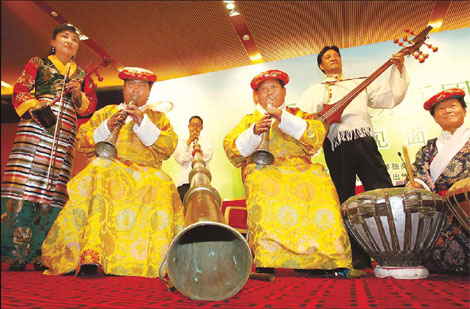Tibetan music on track
|
Musicians of the Tibet Philharmonic Orchestra play traditional Tibetan instruments at the concert held at the National Center for the Performing Arts. [Gan Yuan/China Daily] |
The Tibet Philharmonic Orchestra has antiquated instruments and problems rehearsing but nevertheless gave a standout performance at the ongoing Spring of Symphony Festival.
Classical music is booming in China and even Tibet has a symphony orchestra to be proud of - as shown by the standing ovation it received Friday night at the National Center for the Performing Arts (NCPA).
Under the baton of its principal conductor, Penpa, the Tibet Philharmonic Orchestra (TPO) performed a program of Western pieces and symphonic works composed by Tibetans.
The concert started with Festival Waltz, not Strauss' version but a festival celebration piece by Tenzin Penuo. Then the concertmaster, Champa Tashi, played the violin concerto Butterfly Lovers - scored by Chinese composers Chen Gang and He Zhanhao - and though not a master of the piece the 57-year-old's performance deserved the applause it received.
The first half ended with the third movement of The Canyon of Yarlung Zangbo, composed by Penpa. In 2000, Penpa and two other Tibetan composers created the 40-minute symphony to portray people's lives on the Tibetan Plateau.
For the third movement, Penpa uses Tibetan instruments such as the 4-meter-long tongqin (ritual horns) and dama drums, both used in rituals at Potala Palace, the biwan (a two-stringed fiddle made of ox horn and popular in Kham areas) and zhanian, the Tibetan six-stringed zither.
After the break, they played Dvorak's Symphony No 9 From The New World.
TPO is one of the 11 Chinese orchestras to perform at the on-going Spring of Symphony Festival, presented by NCPA. They traveled nearly 4,000 kilometers, or 50 hours by train, from Lhasa to Beijing and while most other orchestras came just a day or two in advance of their concert dates, the Tibetans arrived a week earlier.
"It takes time to get acclimated. The trumpeters may feel that it is much easier to play, but the others were sleepy during rehearsals," the conductor told us during a rehearsal break.
Penpa is no stranger to Beijing. In 1972, the 12-year-old, who was the eldest son in a construction industry worker's family, went to audition at a small Tibetan opera theater. The coach said his physique and voice were not suitable for a performer. He suggested the boy learned to play an instrument.
Two years later, he was picked by the Art School of the Central University for Nationalities in Beijing to learn erhu, the two-stringed fiddle.
It was during the "cultural revolution" (1966-76) and the university could not provide a stable environment, so after just one and a half years Penpa had to return to Lhasa's Tibetan Opera Theater.
He taught himself while waiting for a new opportunity, which came in 1978, from the Shanghai Conservatory of Music, which was re-recruiting students after the "cultural revolution". Penpa was admitted to learn erhu.
 0
0 








Go to Forum >>0 Comments